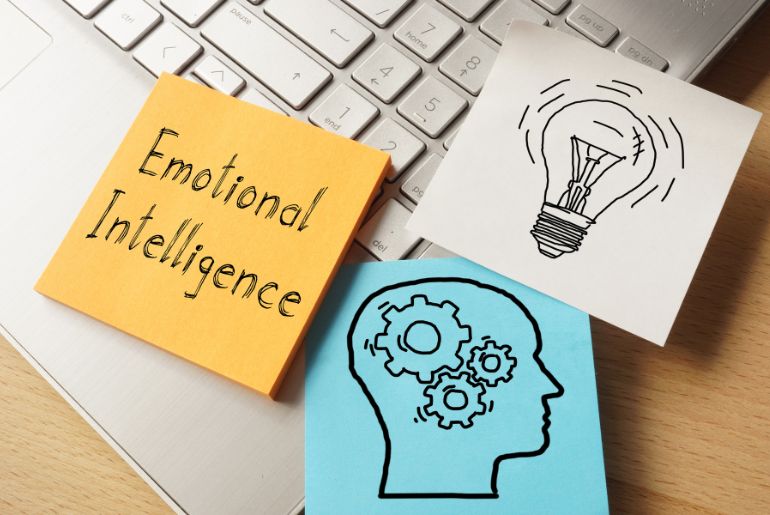Emotional intelligence (EI) is a crucial skill for leaders as it helps them understand, manage, and influence emotions in themselves and others. It allows leaders to foster positive interactions, build meaningful connections, and navigate complex social dynamics. Developing emotional intelligence requires intentional effort and training. In this article, we will explore various emotional intelligence evaluation techniques and strategies for improving emotional intelligence in leaders.

Table of Contents
Key Takeaways:
- Emotional intelligence is vital for effective leadership.
- Utilizing emotional intelligence evaluations to assess emotional intelligence levels helps identify areas for improvement.
- Developing self-awareness and empathy is essential for leaders.
- Managing emotions and stress is crucial for leadership success.
- Leadership coaching and continuous learning support EQ development.
The Importance of Emotional Intelligence in Leadership
Emotional intelligence plays a vital role in effective leadership. Leaders who possess high emotional intelligence are better equipped to understand, manage, and influence their own emotions, as well as the emotions of others. This enables them to build stronger connections with their teams, identify and address problems early on, increase staff retention, and foster a healthier organizational culture.
Emotional intelligence allows leaders to navigate complex social dynamics and make informed decisions that consider the emotional well-being of their team members. By understanding and regulating their own emotions, leaders can respond to challenging situations with composure and demonstrate empathy when interacting with others.
| Benefits of Emotional Intelligence in Leadership | How Emotional Intelligence Impacts Leadership |
|---|---|
| Improved communication and collaboration among team members | Enhanced ability to manage conflicts effectively |
| Increased employee engagement and productivity | Greater understanding of team dynamics |
| Enhanced problem-solving and decision-making skills | Improved ability to inspire and motivate others |
| Higher levels of trust and respect within the organization | Increased adaptability and resilience in the face of challenges |
Leaders with high emotional intelligence are not only self-aware but also skilled in recognizing and managing emotions in others. This allows them to respond appropriately, provide support when needed, and create a positive work environment that fosters growth and development.
Developing emotional intelligence is a continuous journey that requires intentional effort and practice. In the following sections, we will explore various techniques and strategies for assessing and improving emotional intelligence in leaders, including developing self-awareness, building empathy and social skills, managing emotions and stress, and integrating emotional intelligence into leadership programs.
Emotional Intelligence Evaluation in Leaders
Using emotional intelligence evaluation techniques to assess the emotional intelligence levels of leaders is a crucial step in their development journey. Validated emotional intelligence evaluations such as the Emotional Intelligence Appraisal or the Mayer-Salovey-Caruso Emotional Intelligence Test (MSCEIT) can provide valuable insights into leaders’ current emotional intelligence capabilities. These assessments evaluate various aspects of emotional intelligence, including self-awareness, self-regulation, empathy, and social skills.
By using these assessments, organizations can gain a deeper understanding of leaders’ strengths and areas for improvement in terms of emotional intelligence. The assessments provide a holistic view of leaders’ emotional intelligence competencies, helping them identify specific areas where they can focus their development efforts. Feedback from these assessments can guide leaders in understanding how their emotional intelligence impacts their leadership effectiveness.
Additionally, assessing emotional intelligence in leaders can help organizations make informed decisions regarding leadership development initiatives. It allows organizations to allocate resources effectively by targeting specific areas of emotional intelligence that need improvement. Furthermore, by tracking the progress of leaders’ emotional intelligence development over time, organizations can measure the impact of their training and coaching interventions.
Benefits of Emotional Intelligence Evaluations for Leaders:
- Identify leaders’ strengths and weaknesses through emotional intelligence evaluation
- Guide leaders in understanding the impact of emotional intelligence on their leadership effectiveness
- Utilize emotional intelligence evaluations to allocate development resources effectively
- Track and measure the impact of development initiatives
| Emotional Intelligence Assessment Tools | Description |
|---|---|
| Emotional Intelligence Appraisal | A validated assessment tool that measures emotional intelligence competencies |
| Mayer-Salovey-Caruso Emotional Intelligence Test (MSCEIT) | A scientifically rigorous test that assesses emotional intelligence abilities |
Assessing emotional intelligence in leaders through emotional intelligence evaluations is an essential step towards developing effective leaders who can navigate complex social dynamics, foster positive interactions, and build meaningful connections within their organizations. By understanding their emotional intelligence capabilities and areas for improvement, leaders can enhance their leadership effectiveness and create positive work environments.
Developing Self-Awareness in Leaders
Self-awareness is a crucial aspect of emotional intelligence evaluations for leaders. It involves deeply understanding one’s emotions, thoughts, and behaviors and how they affect others. By developing self-awareness, leaders can gain valuable insights into their own strengths and weaknesses, enabling them to make informed decisions and lead with authenticity.
To enhance self-awareness, leaders can engage in various practices. Self-reflection exercises, such as journaling, can help leaders explore their emotions and thoughts. Journaling provides an opportunity for introspection and self-discovery, allowing leaders to gain clarity and identify patterns in their behavior.
Mindfulness practices are another effective way to develop self-awareness. Mindfulness involves being fully present in the moment, aware of one’s thoughts, emotions, and bodily sensations without judgment. By practicing mindfulness, leaders can cultivate a greater sense of self-awareness, which in turn helps them regulate their emotions and make better decisions.
Leaders can also seek feedback from trusted colleagues, team members, or a professional coach. Constructive feedback provides valuable insights into blind spots or areas for improvement that leaders may not be aware of. This feedback can help leaders better understand their impact on others and make necessary adjustments to their leadership style.
Benefits of Developing Self-Awareness
Developing self-awareness in leaders has numerous benefits. Firstly, it helps leaders build stronger relationships with their team members. By understanding their own emotions and how they impact others, leaders can empathize with their team members’ experiences and provide the necessary support and guidance. This builds trust and fosters a positive work environment.
Secondly, self-awareness enables leaders better to manage their emotions and responses in challenging situations. Leaders aware of their triggers and emotional patterns can respond to stress or conflict more constructively, maintaining composure and making thoughtful decisions. This ability to regulate emotions contributes to effective leadership and reduces the likelihood of impulsive or harmful behaviors.
Finally, self-aware leaders are better equipped to leverage their strengths and address their weaknesses. By understanding their own capabilities and limitations, leaders can delegate tasks more effectively, seek support when needed, and continuously develop their skills. This commitment to personal growth sets a positive example for the entire team and fosters a culture of continuous learning within the organization.
Building Empathy and Social Skills
Empathy and social skills are essential qualities for effective leaders. Leaders can foster positive social interactions, build relationships, and effectively manage conflicts by developing these skills. Let’s explore some techniques and strategies for building empathy and social skills in leaders.
Active Listening
Active listening is a crucial skill for building empathy and understanding others. It involves fully focusing on the speaker, maintaining eye contact, and providing verbal and non-verbal cues to show that you are engaged. Practice active listening by paraphrasing the speaker’s words and asking clarifying questions to ensure a deep understanding of their perspective.
Perspective-Taking
Perspective-taking is the ability to see the world from another person’s point of view. It helps leaders empathize with their team members and understand their thoughts, feelings, and motivations. To enhance perspective-taking skills, leaders can engage in activities like role-playing or seeking feedback from others to gain different perspectives on a given situation.
Effective Communication
Effective communication is a vital aspect of social skills. Leaders should aim to communicate clearly, concisely, and respectfully. They should listen actively, speak in a manner that is easy to understand, and adapt their communication style to the needs and preferences of their team members. Regularly providing positive and constructive feedback fosters open communication and builds trust within the team.
By focusing on these techniques and strategies, leaders can enhance their empathy and social skills, creating a positive and inclusive work environment where team members feel valued and supported.
Managing Emotions and Stress
Effective leadership requires managing emotions and navigating high-stress situations with composure. By developing the necessary skills and strategies, leaders can strengthen their emotional intelligence and effectively handle the demands of their roles. Managing emotions and stress is crucial for promoting a positive work environment and ensuring optimal individual and team performance.
Leaders can employ various techniques to manage their emotions and reduce stress levels. Deep breathing exercises, for example, can help regulate emotions and induce a state of calmness. Mindfulness practices contribute to increased self-awareness and a better understanding of emotional triggers. Cognitive reappraisal techniques enable leaders to reframe stressful situations, viewing them differently and adopting a more positive outlook.
It is important for leaders to prioritize self-care as a means of managing emotions and stress. Engaging in exercise, proper nutrition, and adequate sleep can help leaders maintain emotional well-being and handle stress more effectively. Additionally, leaders can seek support from trusted colleagues, mentors, or coaches to discuss challenges and gain valuable insights.
Strategies for Managing Emotions and Stress as a Leader:
- Practice deep breathing exercises to regulate emotions and promote relaxation.
- Engage in mindfulness practices to enhance self-awareness and emotional clarity.
- Utilize cognitive reappraisal techniques to reframe stressful situations and adopt a positive mindset.
- Prioritize self-care through regular exercise, healthy eating, and adequate rest.
- Seek support from trusted colleagues, mentors, or coaches to discuss challenges and gain valuable insights.
By implementing these strategies and making emotional intelligence a priority, leaders can effectively manage their emotions and navigate high-stress situations. This not only benefits their own well-being but also creates a positive and supportive work environment for their teams, leading to improved overall performance and success.
Leadership Coaching for EQ Development
Leadership coaching is a powerful tool for developing emotional intelligence (EQ) in leaders. Through personalized guidance and support, coaches help leaders use emotional intelligence evaluation to identify their emotional strengths and weaknesses, set goals for improvement, and navigate real-life leadership situations. The role of a skilled coach is to provide a safe space for leaders to explore their emotions and develop strategies to enhance their EQ.
In my coaching sessions, I use the Everything DISC profile as a baseline emotional intelligence evaluation to focus on self-reflection, self-awareness, and self-management, all of which are critical components of EQ. By working closely with a coach, leaders can gain a deeper understanding of their own emotions, thoughts, and behaviors, and learn how to manage them effectively. This enables leaders to develop empathy, build stronger relationships, and lead with greater authenticity and influence.
During coaching sessions, leaders can practice new skills and receive feedback on their progress. Coaches use various techniques such as role-playing, simulations, and real-life case studies to help leaders apply their learnings in practical situations. This hands-on approach serves as a form of emotional intelligence evaluation and allows leaders to see the immediate impact of their improved EQ on their leadership effectiveness.
Benefits of Leadership Coaching for EQ Development and Emotional Intelligence Evaluation
- Enhanced self-awareness and self-management
- Improved ability to understand and relate to others
- Enhanced communication and interpersonal skills
- Increased emotional resilience and adaptability
- Greater ability to inspire and motivate others
Leadership coaching for EQ development and emotional intelligence evaluation is a valuable investment for individual leaders and organizations. It not only helps leaders unlock their full potential but also contributes to the overall growth and success of the organization. By prioritizing EQ development through coaching, leaders can create a positive and emotionally intelligent work environment where individuals thrive and teams excel.
| Table: Key Elements of Leadership Coaching for EQ Development |
|---|
| Personalized guidance and support |
| Safe space for self-reflection and growth |
| Practical application of new skills |
| Feedback and accountability |
| Enhanced self-awareness and self-management |
| Improved interpersonal skills and relationships |
| Increased emotional resilience and adaptability |
| Greater leadership influence and impact |
Fostering a Positive Work Environment
Creating a positive work environment is crucial for leaders who aim to cultivate a culture of collaboration, innovation, and productivity. By fostering a positive work environment, leaders can enhance employee engagement, satisfaction, and overall organizational success. Here are some key strategies that leaders can implement:
1. Role-Model Positive Behaviors
Leaders play a significant role in shaping the culture of their organization. By demonstrating positive behaviors such as empathy, respect, and integrity, leaders can inspire their teams to follow suit. Leading by example sets the tone for a positive work environment and encourages employees to engage in similar behaviors.
2. Encourage Open Expression of Emotions and Ideas
A positive work environment is one where employees feel safe and comfortable expressing their emotions, opinions, and ideas. Leaders should create an atmosphere of psychological safety where team members know that their input is valued and welcomed. This can be achieved through active listening, regular team meetings, and encouraging open and honest communication.
3. Manage Conflicts Constructively
Conflicts are inevitable in any workplace, but leaders can effectively manage them to maintain a positive work environment. By promoting empathy, active listening, and effective communication, leaders can help constructively resolve conflicts. Encouraging team members to find win-win solutions and fostering a culture of understanding and collaboration can help prevent conflicts from escalating.
4. Provide Growth and Development Opportunities
Leaders should invest in the growth and development of their team members, offering opportunities for learning and advancement. By providing training programs, mentorship, and career development initiatives, leaders can create an environment where employees feel supported and motivated to reach their full potential. This not only contributes to a positive work environment but also boosts employee retention and engagement.
To create a positive work environment, leaders must prioritize the well-being and satisfaction of their team members. By role-modeling positive behaviors, encouraging open expression, managing conflicts constructively, and providing growth opportunities, leaders can cultivate a work environment that fosters collaboration, innovation, and overall success.

Continuous Learning and Development
Part if the emotional intelligence evaluation process is continuous learning and development, which is essential for leaders to enhance their emotional intelligence. By actively seeking growth opportunities, leaders can deepen their understanding and improve their skills in managing emotions, building relationships, and fostering a positive work environment. Here are some strategies for continuous learning and development:
1. Attend Workshops and Seminars:
Participating in workshops and seminars focused on emotional intelligence can provide leaders with valuable insights and practical tools. These events often feature expert speakers, interactive sessions, and opportunities for networking and sharing experiences with other leaders. Attending such workshops and seminars enables leaders to stay updated with the latest research and best practices in emotional intelligence.
2. Engage in Leadership Coaching:
Leadership coaching can be a powerful way to accelerate personal growth and development in emotional intelligence. Working with a skilled coach allows leaders to receive customized guidance and support tailored to their specific needs. Through regular coaching sessions, leaders can gain new perspectives, develop self-awareness, and implement strategies for enhancing their emotional intelligence skills.
3. Read Relevant Materials:
Reading books, articles, and research papers on emotional intelligence can provide leaders with valuable insights and practical tips. Engaging with diverse perspectives and approaches helps leaders broaden their understanding of emotional intelligence and discover new strategies for personal and professional development.
4. Reflect and Practice Mindfulness:
Regular self-reflection and mindfulness practice can deepen leaders’ self-awareness and enhance their emotional intelligence. Taking time to reflect on past experiences, emotions, and interactions can help leaders identify patterns, strengths, and areas for improvement. Mindfulness practices such as meditation, deep breathing, and journaling can also help leaders cultivate a calm and focused mindset, allowing them to respond to challenging situations with greater emotional intelligence.
By embracing continuous learning and development, leaders can continuously refine their emotional intelligence skills and drive positive change in themselves, their teams, and their organizations.
Integrating Emotional Intelligence into Leadership Programs
Emotional intelligence plays a crucial role in effective leadership. To maximize the potential of leaders, organizations should integrate emotional intelligence into their leadership development programs. By incorporating EQ training as a core component, leaders are provided with regular opportunities to develop and enhance their emotional intelligence skills.
Leadership programs that include emotional intelligence training enable leaders to understand, manage, and influence their own emotions and the emotions of others. This empowers them to foster positive relationships, navigate complex social dynamics, and create a healthy organizational culture. When emotional intelligence is integrated into leadership programs, it becomes deeply embedded in the fabric of the organization, influencing how leaders interact with their teams and shaping the overall success of the organization.

Benefits of Integrating Emotional Intelligence into Leadership Programs
Integrating emotional intelligence into leadership programs offers numerous benefits for both leaders and organizations. Here are some key advantages:
- Enhanced leadership effectiveness: Leaders with well-developed emotional intelligence can effectively navigate diverse and complex leadership challenges, resulting in improved decision-making, problem-solving, and overall leadership performance.
- Improved team performance: Leaders who understand and manage their own emotions, as well as the emotions of their team members, can create a positive work environment that fosters collaboration, innovation, and high-performance.
- Increased staff retention: When leaders demonstrate emotional intelligence, they create a supportive and engaging work environment, leading to higher levels of employee satisfaction and reduced turnover.
- Positive organizational culture: Emotional intelligence training in leadership programs promotes a culture of empathy, trust, and open communication, which contributes to a psychologically safe workplace where individuals can thrive.
Integrating emotional intelligence into leadership programs is a strategic investment that yields long-term benefits for leaders, teams, and organizations. By prioritizing the development of emotional intelligence skills, organizations can cultivate a new generation of leaders who are equipped to navigate the challenges of today’s dynamic business landscape.
Conclusion
Emotional intelligence evaluation is a crucial step in the development of effective leaders. By assessing and improving emotional intelligence in leaders, organizations can unlock their true potential. This evaluation process provides valuable insights into the current state of leaders’ emotional intelligence and helps identify areas for growth.
With the right training and development, leaders can enhance their emotional intelligence skills. This training equips them with the knowledge and tools to understand and manage their own emotions, as well as effectively navigate the emotions of others. The result is improved leadership effectiveness, stronger team performance, and increased staff retention.
Creating a positive work environment is another significant benefit of developing emotional intelligence in leaders. By incorporating emotional intelligence principles into leadership programs, organizations foster a culture that prioritizes open expression of emotions and ideas, constructive conflict management, and role-modeling positive behaviors.
Investing in emotional intelligence evaluation and training for leaders is a wise choice for organizations seeking to maximize their potential. By unlocking their emotional intelligence, leaders can navigate complex social dynamics, build meaningful connections, and inspire their teams to achieve greatness.
FAQ
What is emotional intelligence and why is it important for leaders?
Emotional intelligence is the ability to understand, manage, and influence emotions in oneself and others. It is crucial for leaders as it helps them foster positive interactions, build meaningful connections, and navigate complex social dynamics in the workplace.
How can emotional intelligence be assessed in leaders?
Emotional intelligence can be assessed through validated assessments such as the Emotional Intelligence Appraisal or the Mayer-Salovey-Caruso Emotional Intelligence Test (MSCEIT). These assessments provide feedback on strengths and areas for improvement in emotional intelligence.
How can leaders develop self-awareness?
Leaders can enhance their self-awareness through self-reflection exercises, journaling, and mindfulness practices. By understanding their own emotions, thoughts, and behaviors, leaders can gain insights into their leadership style and its impact on others.
How can leaders build empathy and social skills?
Leaders can develop empathy and social skills through training that focuses on active listening, perspective-taking, and effective communication. These skills enable leaders to foster positive social interactions, build relationships, and manage conflicts constructively.
How can leaders manage their own emotions and stress?
Leaders can learn to manage their emotions effectively through training on emotional regulation and stress management techniques such as deep breathing, mindfulness, and cognitive reappraisal. These techniques help leaders cope with difficult emotions and stressful situations.
How can leadership coaching support emotional intelligence development?
Individual coaching can support leaders in their emotional intelligence development. A skilled coach can help leaders identify their emotional strengths and weaknesses, set goals for improvement, and provide ongoing support and accountability.
What role does emotional intelligence play in creating a positive work environment?
Leaders with high emotional intelligence play a crucial role in creating a positive work environment. They role-model positive behaviors, encourage open expression of emotions and ideas, and manage conflicts constructively, contributing to a psychologically safe workplace.
How can leaders continuously develop their emotional intelligence?
Leaders should engage in ongoing professional development activities focused on emotional intelligence, such as workshops, seminars, coaching sessions, and reading materials. These activities help enhance their emotional intelligence skills and knowledge.
How can emotional intelligence be integrated into leadership programs?
Emotional intelligence should be integrated into leadership development programs within organizations. EQ training should be a core component of these initiatives, providing leaders with regular opportunities to develop and enhance their emotional intelligence skills.
What are the benefits of evaluating and developing emotional intelligence in leaders?
By assessing and developing emotional intelligence in leaders, organizations can enhance their leadership effectiveness, improve team performance, increase staff retention, and create a positive work environment.
Source Links
- 20 Tips for Leaders: Developing Your Emotional Intelligence
- Emotional Intelligence in Leadership: Strategies for Developing EQ through Training
- How Do You Assess the Emotional Intelligence of Potential Leaders?



